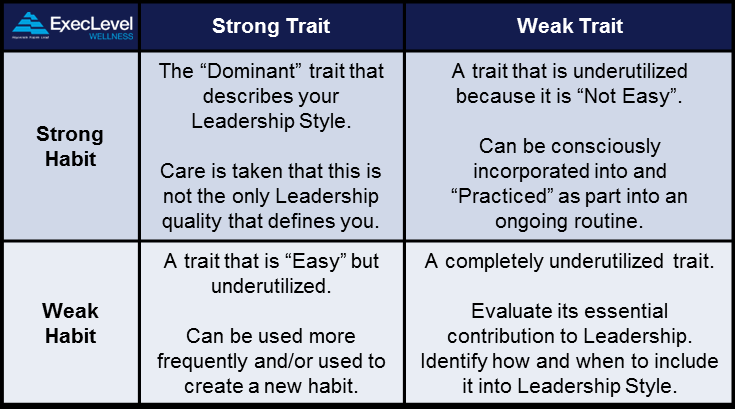There are many attributes of leadership, all equally important, and all equally difficult to explain. Their importance lies in uniting to make an individual more complete and prepare him/her for the many tasks that leaders encounter.
The difficulty in explaining them lies in the fact that, away from their general topics, they are individual characteristics and may be understood/defined differently depending on the person. Moreover, attributes of leadership are often described in terms of “traits” (or “quality”), and “habits”, which are different things.
To distinguish, a trait (quality) is something you possess. Examples include confidence, commitment, honesty, trust, creativity, passion and analytical/strategic reasoning (among others). They are attributes that you have acquired, and in some cases have been part of your being for so long that you consider yourself as having been born with them.
Habits, on the other hand, are things you practice. In the simplest sense, they are how you apply your traits, and can be thought of in terms of frequency, quantity and style. For example, when working on a problem, are you in the habit of applying your trait of creativity by working alone to a near-complete solution before presenting it to your team, or do you include your team from the beginning?
Because there are several of each – traits and habits – it is inevitable that some will be stronger than others. As a result, you will occasionally run into leaders that will exhibit their strongest trait virtually all of the time – e.g., an outward appearance of confidence every time you meet them. However, in sustained conversation, you occasionally find that some severely lack other essential traits of leadership – e.g., listening and trusting in their team. In short, some of the essential traits of leadership have fallen out of habit.
Because leadership requires a balance of all attributes at all times, it is important not to be caught in such shortcomings. Here is where traits and habits converge, in the form of discipline.

Discipline is best viewed as the key element that keeps the attributes of leadership in balance. A good example regarding traits is having the discipline to keep in check your passion vs. your commitment vs. your patience. Many times over when describing a project, other participants are not immediately up to your level of understanding, and resulting conversations can becomes argumentative.
Discipline regarding habits is an even easier concept. At the extreme, it is practicing things we do not like. More frequently, however, it is integrating something beneficial into our routine, and it works in both the thesis and anti-thesis mode – e.g., building time into your routine to check on (and show true interest) in team members, or on the other hand, not letting trivialities distract you, such as checking on e-communications the instant they appear.
Lastly, discipline takes on a bigger picture when traits and habits are consciously combined. In this sense a weak trait is incorporated into a strong habit, or vice versa. Both cases leverage your strongest traits and most frequent habits, things that are probably already easy for you. In the former case, a weaker trait is incorporated into a frequent routine and is strengthened as a result of continual practice. The latter scenario takes advantage of a strong trait by, foremost, using it more, and can also serve as the basis for developing an altogether new habit. The other scenarios, where both traits and habits are simultaneously strong or weak, are equally important in terms of self-evaluation, and require equal discipline in bringing a dormant trait into play, or toning down on a dominant trait that has become overbearing.

In a practical sense, the need for discipline is emphasized by the phrase “Leaders Aren’t Born, They Are Made”, which is attributed to Vince Lombardi. The simple essence of the phrase is that Leadership, as with most everything, requires continuous work to reach the highest level.
As described above, this work may require an individual to identify and correct a weakness, while simultaneously taking care to not sacrifice a strength. Beyond the individual, however, is that the phrase was put forward in the context of football, and more fittingly, the football team. In this sense, it expresses the need for an individual to excel as a leader in their particular role, and understand that that role is one of many in the larger dynamic of the team.
Ironically, the amount of work that goes into creating and maintaining highly-functional teams is often overlooked – because to the observer this is exactly how the team is supposed to function. The counterpoint is when just one individual does not have the discipline to work at leadership. These are individuals who in spite of all of their talents are unable to balance their leadership style, and in turn, become disruptive to the team. By and large, they are often released so that the team can operate at its highest level. So in a sense, the fundamental expectations of a Leader are to discipline themselves for individual completeness, understand a given circumstance in which they find themselves, and apply themselves toward moving the whole dynamic forward, more times than not when relying on others of similar Leadership characteristics.
